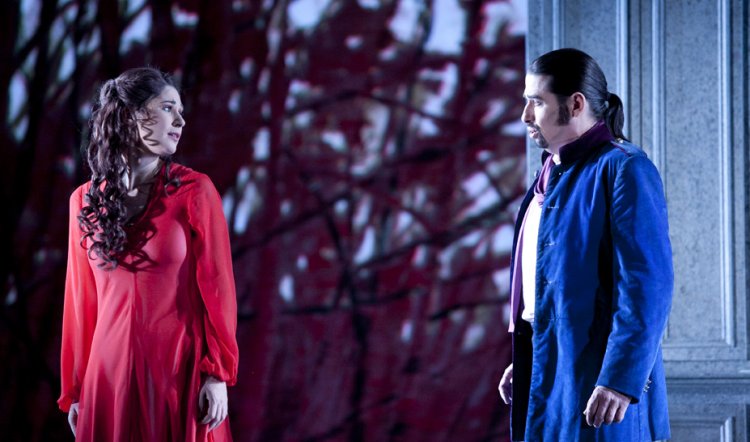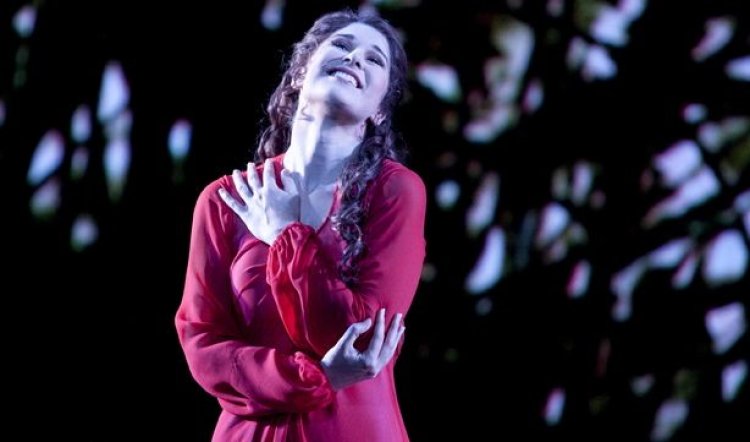
EUGENE ONEGIN
EUGENE ONEGIN, Opera Australia in co-production with the Royal Opera House, Covent Garden and Fondazione Teatro Regio, Turin at the Joan Sutherland Theatre, Sydney Opera House; 29 February- 28 March 2014. Photography by Lisa Tomasetti: above - Nicole Car and Dalibor Jenis; right Nicole Car.
Tchaikovsky's beautiful music and Pushkin's classic story of young love offered and rejected and forever regretted are an irresistible combination. Kasper Holten, the ROH's new-ish director of opera has loved it since childhood and he chose it for his directorial debut for the company. It's now come to Sydney (then moves to Melbourne) and it's impressive in many aspects.
The first and possibly most consequential is the musical and artistic coming-of-age of Nicole Car as Tatyana, the girl who hopelessly loved, lost and finally - painfully - grew up. She is vocally superb with a strongly developing and true soprano and the confidence to take it where she will. She is also dramatically and visually convincing as the young country girl who puts heartache behind her to become the dutiful wife of Prince Gremin (Konstantin Gorny) and therefore a queen of Moscow high society. Hers is the pivotal presence in this staging (European singers performed the premiere London season) and she is outstanding. She is not yet 30 and an international career must surely be in her hands, should she wish to take it.
Nicole Car is partnered as co-principal by OA debutant Dalibor Jenis as the cynical love-rat Onegin. Unwilling to settle for country life and Tatyana's innocently offered love, he embarks on a life of foreign travel and excess after killing his best friend in a duel brought about by his own heedless behaviour. Years later Onegin returns to the realisation that Tatyana really is his true love; but despite her feelings she rejects his overtures. It is too late: memory is to be looked back upon, sparingly, not rekindled.
Dalibor Jenis too has a strong dramatic and visual presence and it's easy to see why he would capture Tatyana's heart. Vocally he is a powerful romantic presence with the warmth and emotion to meet the histrionic demands of Tchaikovsky's score. He is an entirely credible (anti-)hero, making the somewhat awkward transition from cold indifference to yearning lover plausible and exciting.
All the above lead inevitably to the production's most obvious problem: Holten's decision to semi-split the two leads between the singers and a pair of dancers (Emily Ranford and Sam Colbey). Dressed in identical costumes, they are supposed to be the younger Tatyana and Onegin and to convey emotions and actions of the two as their long-gone selves. This may have seemed a more persuasive idea in London where the two principals were neither youthful nor especially romantic looking, but that's to ignore or mistrust the music.
A soprano of even reasonable capability can convey Tatyana's youthful ardour and physical spirit because it's all there in Tchaikovsky's exquisite character motif and in the body of the music. The same can be said for Onegin. Give the score to wonderful singers - Car and Jenis for instance - and the dancers are extraneous and a distraction; not least because they don't actually dance much but merely emote and also, they disappear for extended periods. This makes their purpose and reappearance disjointed and even more of a distraction, poor loves.
It's perhaps unfortunate that Eugene Onegin comes to the Opera House so soon after the similarly clunky doubling of singers and dancers in the Sydney Festival big event, Dido and Aeneas. At least Holten didn't go the full Sasha Waltz fish-tank. Nevertheless, it was impossible to watch Car and Jenis being occasionally upstaged by a dancing alter ego and without thinking they were lucky not to be required to swim and sing simultaneously. Regietheater has a lot to answer for.
Ghost-remembrances of things past aside, the casting of the Sydney production is spectacularly good and almost overcomes all directorial and design obstacles. But they do need help. For instance, there's the gown-snagging dead tree centre-stage in act two. It has to go or be drastically pruned, then the audience can relax and not gasp as the women swish around trying to avoid it while appearing not to. On Covent Garden's massive stage the tree would be fine and symbolic etc etc; in the Joan Sutherland it's just a traffic hazard.
The same has to be said of Onegin's best friend Lensky. As acted and sung by James Eggleston, Lensky is every bit a delightfully goofy pal and number two romantic hero. He effortlessly conveys his love for Olga (Sian Pendry) and helpless rage as she is flirted with by the careless Onegin; and he is touching in his shaky pride and insistence on satisfaction and honour. Then he is shot dead. Not just dead but lying dead in plain sight for the remainder of the opera which is – in Pushkin-Tchaikovsky time – about ten years and in real time, also quite a while.

Again the viewer – this one anyway – is distracted from the main action. Is he comfortable? How does he stay so still and not fall asleep or be overcome by the unbearable need to fidget? Lying like that must be hell on your lower back. Why is he there? Why wasn't he solemnly carried off by some hefty Russian peasants/chorus? What does it mean that he's lying there being stepped over and around by Olga, Tatyana and Onegin and they don't see him? Does he symbolise the elephant in the room – of dead honour? Innocence? Times past? Answer comes there none and it's an irritating if amazingly disciplined end to a fine performance.
Well before this however, the crucial declaration of love - written by Tatyana to Onegin - has also been dramatically skewed by splitting the emotional focus between Nicole Car, who has to look hopeful and agonised while Emily Ranford scribbles away, also looking hopeful and agonised. For the viewer it's a little like watching tennis - back and forth, back and forth - but without a ball and therefore little point. Except that Tchaikovsky finally wins because the music overcomes virtually all.
In the supporting roles mezzo Sian Pendry, as Tatyana's sister, also gives a fine dramatic and vocal performance and her pairing with David Eggleston is balanced and convincing. As the girls' ambitious mother Madam Larina, Dominica Matthews is pert and interfering - and vocally excellent. Jacqueline Dark continues her line of richly detailed characters with Filippyevna, the family retainer whose outsize ugg boots speak of the steppes even as she sings of duty and hands around goblets of kvas. In an all-too-short cameo Kanen Breen brings laughs, levity and satirical French foppery to the role of the French tutor Triquet. And Konstantin Gorny is also a brief but telling and touching presence as Prince Gremin who, in this reading, overhears his wife's declaration of duty and love.
This Eugene Onegin soars musically and dramatically and that's not only through the leading cast members but also the Opera Australia Chorus and the Australian Opera and Ballet Orchestra under the baton of Guillaume Tourniaire. The latter brings the very best out of the chorus and orchestra all members seem to relish the excitement, colour and subtlety of the music and respond accordingly.
Set designer Mia Stensgaard, with lighting designer Wolfgang Goebbel, has created an enclosed, sometimes gloomy, occasionally sun-drenched space that echoes a distant Enlightenment. The one set, with minor adjustments, doubles for rural Russia and a shabby Moscow palace. Beyond the tall, shuttered doors is a simple but imaginatively effective landscape that morphs from the rippling golden wheat of summer, to autumn-red trees and then to the bleak winter monotones of the same woodland (video designer Leo Warner for 59 Productions).
Katrina Lindsay's costumes are also persuasive in the context of the production's over-arching aesthetic. The country peasants and Moscow aristocracy wear black and shades of charcoal, colour is permitted only to the principals - clear red beneath glittering white for Tatyana, powder blue for Olga, a soft but darker blue for Lensky and a stronger almost-Klein blue and swagger denotes Onegin's vivid contrast to his true love. The relative absence of colour is mirrored in a similar absence of recognisable dance - at the ball or when Onegin dives into licentious merriment and an orchestral entr'acte with a series of women they are solo taupe-clad nymphs rather than panting society ladies.
Overall, the Australian cast - and visiting singers - are the overwhelming successes of Eugene Onegin, the creative elements less so. Holten's stated intent of exploring and highlighting Pushkin's tale of memory, loss and identity is, I think, blunted by his approach. In his notes he writes, "We tried to find ways which we feel can make the audience experience the immediate emotional identification which is what I think Tchaikovsky's music offers us."
It's a great pity he didn't trust the music to do exactly what he recognises it does, and not attempt to gild a lily that already gleams bright. As it is, Nicole Car sings the essence of Tchaikovsky's yearning and melancholy, while Dalibor Jenis conveys the journey to profound regret from youthful indifference. They are wonderful and, with the rest of the company and the superb conductor, the depths of beauty, emotion and sadness inherent in the score are almost reached - almost.



